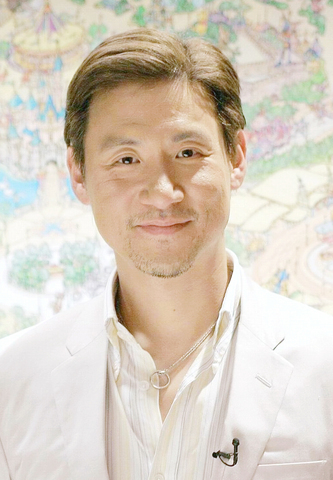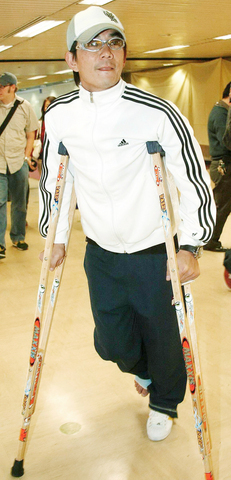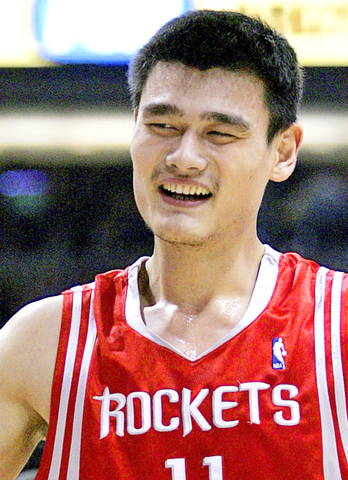Family values were at the fore this week with news about no less than five pop-star couples either having kids, expecting kids or tying the knot.
Taiwanese pop singer Richie Ren (任賢齊) announced this week that his long-time girlfriend Tina is now eight months pregnant and will give birth some time next month. They were mum on speculation that they were "first getting on the bus and buying a ticket later" -- meaning to have a kid and then get married. But The Great Entertainment Daily (大成報) claims to have knowledge that the pair were actually married two years ago, abroad, but simply haven't registered the marriage in Taiwan yet.
With all the hoopla over the rumored marriage between Faye Wong (王菲) and Li Yapeng (李亞鵬) as cover, Li's erstwhile girlfriend, singer/actress Zhou Xun (周迅) has reportedly quietly tied the knot between herself and her boyfriend of several years, the Taiwanese stylist Lee Da-chi (李大齊).

PHOTO: TAIPEI TIMES
Chang Fei's (張菲) favorite Belorussian, Margarita, with whom he has been filmed in all kinds of intimate poses and
situations, poured ice on the geri-curled ladies man's hopes by announcing this week that she is already married and has been now for four years. The husband is Taiwanese and the two no longer live together. Nevertheless, ever the gentleman, Chang said he would no longer put the moves on Margarita because he doesn't chase married women. "We're through," he's quoted as saying in the Apple Daily (
Hong Kong pop sensation Jackie Cheung (張學友) dropped a bomb this week by revealing to media that his wife had a baby daughter on March 8. Amazingly, Hong Kong's notoriously snooping media -- they've lately been camping outside his younger daughter's school hoping for pictures of her -- were shut out from any word of the birth until this week.

PHOTO: TAIPEI TIMES
And actress Lee Chien-rong (李篟蓉) took the rumor out of the talk of her second pregnancy by confirming that she's indeed expecting, but declined to say when the next member of the family would be making an appearance.
Today is the long-anticipated release of The Wayward Cloud (天邊一朵雲), Tsai Ming-liang's (蔡明亮) latest film. Pop Stop has heard through the grapevine that the movie is yet another self-indulgent piece of art-house masturbation, but that this time there's plenty of sex, which might explain why it will show on 40 screens all around Taiwan and has received more column inches of coverage than probably all his previous movies combined. This is in contrast to last year's Golden Horse winner Kekexili (可可西里), a truly masterful Chinese film, beautifully shot and with more powerful messages that was shown on a paltry two screens in Taipei (see reviews on page 17).
Forbes magazine released its annual list of richest and most famous people in China this week, with NBA star Yao Ming (姚明) at the top, followed by Zhang Ziyi (章子怡), then the Olympic hurdles cannonball Liu Xiang (劉翔), then Vicki Zhao (趙薇) and Faye Wong in fifth place.

PHOTO: AP
After an almost three-year absence, Coco Lee (李玟) is back with a new album, but not in Chinese this time. Back in her native US, the singer is releasing her second English-language album, this time with special editions set to be released in India and South Korea, each with tracks by stars from those countries.

US President Donald Trump may have hoped for an impromptu talk with his old friend Kim Jong-un during a recent trip to Asia, but analysts say the increasingly emboldened North Korean despot had few good reasons to join the photo-op. Trump sent repeated overtures to Kim during his barnstorming tour of Asia, saying he was “100 percent” open to a meeting and even bucking decades of US policy by conceding that North Korea was “sort of a nuclear power.” But Pyongyang kept mum on the invitation, instead firing off missiles and sending its foreign minister to Russia and Belarus, with whom it

When Taiwan was battered by storms this summer, the only crumb of comfort I could take was knowing that some advice I’d drafted several weeks earlier had been correct. Regarding the Southern Cross-Island Highway (南橫公路), a spectacular high-elevation route connecting Taiwan’s southwest with the country’s southeast, I’d written: “The precarious existence of this road cannot be overstated; those hoping to drive or ride all the way across should have a backup plan.” As this article was going to press, the middle section of the highway, between Meishankou (梅山口) in Kaohsiung and Siangyang (向陽) in Taitung County, was still closed to outsiders

Many people noticed the flood of pro-China propaganda across a number of venues in recent weeks that looks like a coordinated assault on US Taiwan policy. It does look like an effort intended to influence the US before the meeting between US President Donald Trump and Chinese dictator Xi Jinping (習近平) over the weekend. Jennifer Kavanagh’s piece in the New York Times in September appears to be the opening strike of the current campaign. She followed up last week in the Lowy Interpreter, blaming the US for causing the PRC to escalate in the Philippines and Taiwan, saying that as

The Chinese Communist Party (CCP) has a dystopian, radical and dangerous conception of itself. Few are aware of this very fundamental difference between how they view power and how the rest of the world does. Even those of us who have lived in China sometimes fall back into the trap of viewing it through the lens of the power relationships common throughout the rest of the world, instead of understanding the CCP as it conceives of itself. Broadly speaking, the concepts of the people, race, culture, civilization, nation, government and religion are separate, though often overlapping and intertwined. A government